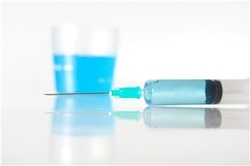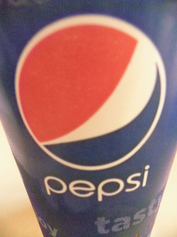 By Leslie Wade, CNN(CNN) -- Sugar-sweetened beverages are linked to more than 180,000 obesity-related deaths worldwide each year, according to new research presented this week at an American Heart Association conference. "This means about one in every 100 deaths from obesity-related diseases is caused by drinking sugary beverages," says study author Gitanjali Singh, a postdoctoral research fellow at the Harvard School of Public Health. Among the world's 35 largest countries, Mexico had the highest death rates from sugary drinks, and Bangladesh had the lowest, according to the study. The United States ranked third. However, the American Beverage Association dismissed the research as "more about sensationalism than science."
 From Science NewsA component of bee venom packaged in super-tiny blobs can knock out HIV, a new study finds. Researchers testing the delivery system in lab dishes report that these nanoparticles attach to and destroy the virus without damaging cells, offering an early glimpse of a technology that might — with a lot more testing — prevent HIV infection in some people. “This is definitely a novel approach,” says Antony Gomes, a physiologist at the University of Calcutta in India, who studies the medical use of venoms. “There are very few reports available on venom-based treatment against viruses. This type of research has the potential to proceed further for product development.”
 (NaturalNews) Thursday, March 21, 2013
by Mike Adams, the Health Ranger
In yet another blow to GMOs, several major U.S. food retailers have signed on to the "Campaign for GE-Free Seafood" found at http://www.foe.org/gefreeseafoodThese retailers include Whole Foods, Trader Joe's, Aldi and many more. It's the latest private sector blow to the deceptive biotech industry. Consumers overwhelming reject GMOs even if the FDA conspires with biotechnology companies to try to shove genetically engineered food down their throats. Activist organizations like Natural News, the Organic Consumers Association and the Institute for Responsible Technology have helped organize constant grassroots pressure on food retailers to either label GMOs or reject them outright.
 By Ingri Cassel
DrCarley.com
- For each million people vaccinated with the smallpox vaccine, as many as 250 could die, according to the American Medical Association. Multiply 250 times 285 (millions of Americans) and the possible deaths from universal smallpox vaccination could equal 71,250. ~ Journal of the American Medical Association, June 9, 1999, Vol. 281, No. 22, p. 2132.
- "The American Medical Association said that it was not in favor of an immediate mass U.S. smallpox vaccination program, saying the potential threat of a bioterror attack did not warrant inoculating every American against the disease." ~Reuters, December 12, 2001.
- "Right now the risk of getting the vaccine is higher than the benefit. You could get a secondary infection, a full-blown systemic infection." ~Marie Rau, Panhandle Health District nurse, quoted by The Spokesman-Review, November 20, 2001.
- CDC director Jeffrey Koplan has admitted that universal smallpox vaccination could unleash a significant number of side-effects. He said that because many parts of our population do not have a "robust immune system," a fair number of people could have serious reactions. ~Koplan speaking on the PBS special "Bioterror Propaganda" aired by WETA, November 14, 2001.
- If the entire nation were to receive a smallpox vaccine, several thousand people would likely develop encephalitis, an inflammation of the brain. ~Washington Post, Dec. 26, 2001.
- Roger J. Pomerantz, chief of the infectious disease department at Thomas Jefferson University in Philadelphia, said that doctors have no idea what the smallpox vaccine might do to people at the extremes of life--less than 2 and older than 65. He said that an even greater concern would be its effect on people with weakened immune systems from HIV infection, chemotherapy or transplants. ~Washington Post, Dec. 26, 2001.
- "Researchers have been reluctant to recommend a new vaccination program which would use the smallpox vaccine for the local population because the vaccine can cause disease and death in persons with inadequate immune systems." ~Science, Vol. 277, July 18, 1997, pp. 312-13.
- Routine smallpox vaccination in the United States ended in 1972. Officials are hesitant to resume the immunizations because the vaccine is the most reactive of all and has been linked to serious side effects, including death. ~ Reuters, November 29, 2001.
- Eight printed pages of medical studies documenting the many serious side effects of smallpox vaccination can be obtained at www.whale.to/vaccines/smallpox.html. See "smallpox vaccine adverse reactions 66-76." [Note: go to the home page above and put "smallpox vaccine adverse reaction" in the search engine.] Repercussions include serious brain and heart diseases, autism, abnormal chromosomal changes, diabetes, various cancers and leukemias, plus demyelination of nerve tissue years after vaccination.
- The U.S. Supreme Court has ruled that vaccination must not be forced on persons whose physical condition would make such vaccination "cruel and inhuman." In other words, the state has no right to command that an individual sacrifice his life in the name of public health. ~Jacobsen V. Massachusetts, 197 U.S. 11 (1905).
- By the 1920s, several British medical researchers documented that smallpox was not only more common among the VACCINATED, but that the DEATH RATE from smallpox was actually higher among those who had been vaccinated. This indicates that the vaccine was ineffective and predisposed vaccinated persons to more lethal disease. ~Vaccination, Dr. Viera Scheibner, Australia, 1993, pp. 205-220.
- Getting a vaccination does not guarantee immunity. ~CDC, January 28, 1994.
- By 1987, scientific evidence indicated that the World Health Organization's 13-year global smallpox vaccination campaign may have awakened dormant HIV infection in many vaccines. ~Times (in London) May 11, 1987.
- Vaccines made from animal substrate contain animal viruses that are impossible to filter out. By 1961, scientists discovered that animal viruses in vaccines, including smallpox, could act as a carcinogen when given to mice in combination with cancer-causing chemicals, even in amounts too small to induce tumors alone. They concluded that vaccine viruses function as a catalyst for tumor production. ~Science, December 15, 1961.
- Some of the new smallpox vaccine doses will be created with animal substrate. Because the vaccine will incorporate vaccinia, the cowpox virus, many wonder about possible mad-cow contamination. Fifty-five million doses of the new vaccine will be created using a cell line dating back to 1966 and cultured from the lung tissues of an aborted human fetus. ~World Net Daily, December 4, 2001.
- The new smallpox vaccine will be genetically engineered. Many scientists believe that genetically engineered vaccines may be responsible for the global epidemic of auto-immune disease and neurological dysfunction. ~American College of Rheumatology, annual meeting, Nov. 8-12, 1998. Merck's genetically engineered hepatitis B vaccine, Recombivax HB, is a classic example. According to Dr. Bonnie Dunbar of Baylor College of Medicine, many thousands of reported adverse reactions to the hepatitis B vaccine include: chronic fatigue, neurological disorders, rheumatoid arthritis, lupus and MS-like disease. ~Testimony of Dr. Dunbar to Texas Dept. of Health, March 12, 1999. Over 15,000 French citizens sued the French government to stop mandatory hepatitis B injections for school children because of resulting auto-immune diseases. ~Science, July 31, 1998. Dr. John Classen has published voluminous data showing that the hepatitis B and other vaccines are closely linked to the development of insulin dependent diabetes. ~Infectious Diseases in Clinical Practice, October 22, 1997.
- The British vaccine manufacturer Medeva has a horrendous record of contamination and blunders. In 2000, the FDA found that Medeva was making vaccines in conditions of filth, resulting in contaminated products. Medeva had been illegally using bovine medium to culture its polio vaccines, then lied about it. Medeva also used the blood of a Creutzfeldt-Jakob victim (mad cow) to manufacture 83,000 doses of polio vaccine used for (against?) Irish children. Nevertheless, the FDA allowed the USA to accept Medeva's flu vaccine (Fluvirin) for the year 2000. ~London Observer series: October 20-26, 2000.
- In 2001, the British socialized health care system was reported to be in a state of collapse, with many hospitals and labs operating in abysmal filth. Five thousand people die each year from infections contracted in British hospitals; 10,000 become deathly ill from such infections. Sterilization procedures are barely adequate and said to be risking the spread of mad cow disease. Government ministers are reportedly trying to hush up the scandal. www.itn.co.uk/Jan 06, 2001; The Sunday Times of London, November 12, 2001.
- The U.S. government apparently intends to conduct NO double blind studies on the safety and efficacy of the new smallpox vaccine. It has ordered 286 million doses, one for every man, woman and child in America at a cost of $428 million. At least half of this vaccine will be delivered by Acambis PLC of great Britain.
Tip of the Week: Keep all vaccine needles away from your body! Vaccination Liberation Idaho Chapter Ingri Cassel, President P.O. Box 1444 Coeur d'Alene, ID 83816 (208) 255-2307 / 765-8421 [email protected] www.vaclib.org "The Right to Know, The Freedom to Abstain" http://www.drcarley.com/twenty_reasons_not_to_take_small.htm
 LARGO, FL, March 5, 2012 (LifeSiteNews.com) -
The Pepsi Company, which is set to release the new product Pepsi Next in the coming weeks, is facing a more robust boycott as pro-life activists protest the company use of cells derived from an aborted fetus in flavor-enhancing research. But Pepsi has succeeded, with help from the Obama Administration, in keeping its controversial operations from consideration by its shareholders.
In a decision delivered Feb 28th, President Obama’s Security and Exchange Commission (SEC) ruled that PepsiCo’s use of cells derived from aborted fetal remains in their research and development agreement with Senomyx to produce flavor enhancers falls under “ordinary business operations.”
The letter signed by Attorney Brian Pitko of the SEC Office of Chief Counsel was sent in response to a 36-page document submitted by PepsiCo attorneys in January, 2012. In that filing, PepsiCo pleaded with the SEC to reject the Shareholder’s Resolution filed in October 2011 that the company “adopt a corporate policy that recognizes human rights and employs ethical standards which do not involve using the remains of aborted human beings in both private and collaborative research and development agreements.”
 From Streetibsider.comWhole Foods Market (Nasdaq: WFM) announced at Natural Products Expo West that, by 2018, all products in its U.S. and Canadian stores must be labeled to indicate whether they contain genetically modified organisms (GMOs). It is the first national grocery chain to set a deadline for full GMO transparency."We are putting a stake in the ground on GMO labeling to support the consumer's right to know," said Walter Robb, co-CEO of Whole Foods Market. "The prevalence of GMOs in the U.S. paired with nonexistent mandatory labeling makes it very difficult to select non-GMO products. We are increasing our support of organic, and we are working with our supplier partners to grow our non-GMO supply chain to ensure we can continue to provide these choices in the future."
 Organic tomatoes are healthier
 From thedailysheeple.comTwo powerful dairy organizations, The International Dairy Foods Association (IDFA) and the National Milk Producers Federation (NMPF), are petitioning the Food and Drug Administration to allow aspartame and other artificial sweeteners to be added milk and other dairy products without a label. The FDA currently allows the dairy industry to use “nutritive sweeteners” including sugar and high fructose corn syrup in many of their products. Nutritive sweeteners are defined as sweeteners with calories. This petition officially seeks to amend the standard of identification for milk, cream, and 17 other dairy products like yogurt, sweetened condensed milk, sour cream, and others to provide for the use of any “safe and suitable sweetener” on the market They claim that aspartame and other artificial sweeteners would promote healthy eating and is good for school children.
 By Duke Medicine News and Communications
DURHAM, N.C. -- Environmental exposure to bisphenol A (BPA), a widespread chemical found in plastics and resins, may suppress a gene vital to nerve cell function and to the development of the central nervous system, according to a study led by researchers at Duke Medicine.
The researchers published their findings - which were observed in cortical neurons of mice, rats and humans - in the journal Proceedings of the National Academy of Sciences on Feb. 25, 2013.
|










